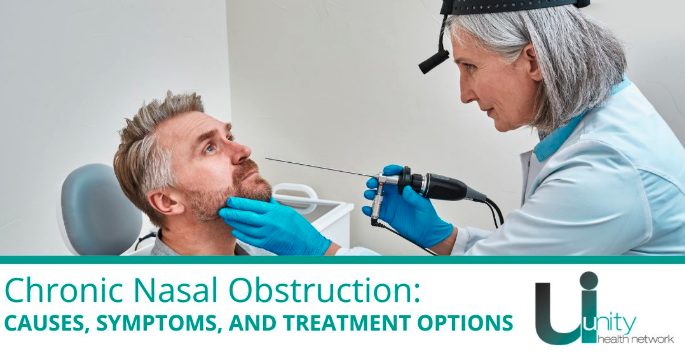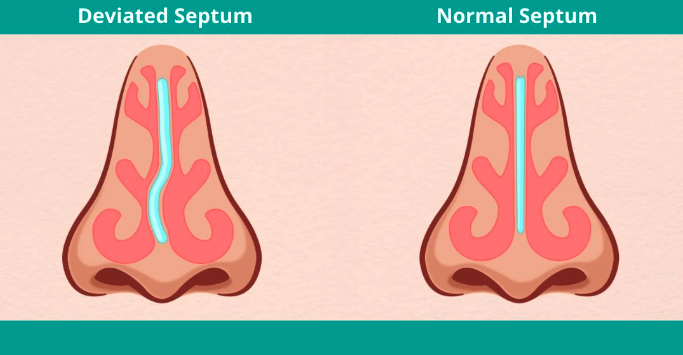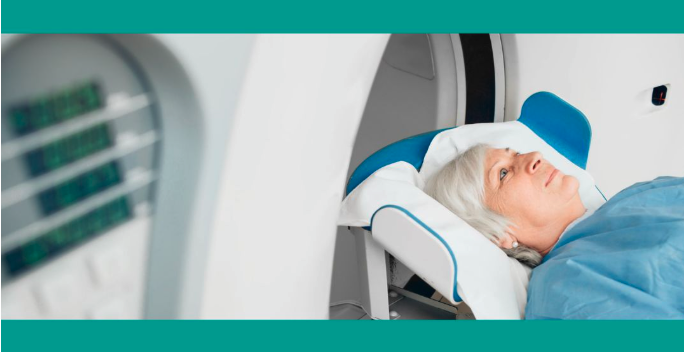Chronic Nasal Obstruction: Causes, Symptoms, and Treatment Options
Jun 25, 2025

Author: Dr. Seth Willen
READ BIO
Chronic nasal obstruction can make everyday life uncomfortable. Whether it’s hard to breathe through your nose, you’ve lost your sense of smell, or you're experiencing frequent sinus infections, this ongoing issue can interfere with sleep, work, and your overall well-being.
To help explain the most common causes, symptoms, and treatments, we spoke with Dr. Seth Willen, a board-certified Otolaryngologist (otherwise known as an ENT, short for ear, nose, and throat specialist) at Unity Health Network. Dr. Willen shared helpful insights about what patients experience and how ENT specialists can help them breathe easier.
What Is Chronic Nasal Obstruction?
Nasal obstruction simply means a blockage in the nasal passages that makes it hard to breathe through the nose. While temporary congestion is common with a cold or allergies, chronic nasal obstruction lasts for months or even years. As Dr. Willen explains, "Chronic nasal obstruction means that it didn’t start for a few weeks during a cold—it’s an ongoing problem."
Common Causes of Nasal Obstruction

Septal Deviation
A deviated septum occurs when the thin wall between your nostrils is displaced to one side. This can be something you’re born with or a result of an injury. It can lead to one-sided or total nasal blockage and may worsen over time. "One of the more common things that we see is chronic nasal obstruction due to a septal deviation or allergic rhinitis," Dr. Willen noted.
Allergic Rhinitis
Allergic rhinitis, also known as hay fever, occurs when your immune system reacts to allergens such as pollen, dust, or pet dander. This causes inflammation in the nasal passages, leading to congestion, sneezing, and a runny nose. Dr. Willen often sees patients with these symptoms who haven’t found relief through over-the-counter medications.
Nasal Polyps
Nasal polyps are non-cancerous growths that develop in the lining of the nose or sinuses. They're often linked to chronic sinusitis and can block airflow. "Nasal polyps are a form of chronic sinusitis," said Dr. Willen. "They’re inflammatory and primarily cause nasal obstruction and decreased sense of smell."
Symptoms to Watch For
If you’re experiencing the following symptoms for 12 weeks or longer, you may be dealing with chronic nasal obstruction:
- Difficulty breathing through your nose
- Congestion on one or both sides
- Frequent sinus infections
- Loss or reduction in sense of smell
- Snoring or sleeping with your mouth open
- Post-nasal drip or facial pressure
Dr. Willen emphasized that, "For most people, it really is chronic nasal obstruction and decreased sense of smell. They may have frequent sinus infections."
How Chronic Nasal Obstruction Is Diagnosed
Nasal Endoscopy
To accurately diagnose nasal obstruction, ENT specialists often perform a nasal endoscopy. This in-office procedure uses a small camera to get a clear view of the inside of the nasal passages and sinuses. "We look in the nasal cavity with a special camera called a nasal endoscope to evaluate how diffuse nasal polyps are," Dr. Willen shared, adding that this tool is essential in tailoring a treatment plan.
CT Scans
In some cases, imaging is necessary to fully understand the extent of the obstruction or sinus involvement. "We often get CT scans to get a better sense of the extent of nasal polyps and sinusitis," said Dr. Willen. These scans provide a detailed look at your sinus structure and help identify underlying issues that may not be visible during an endoscopy.

Treatment Options for Chronic Nasal Obstruction
Medical Management
The first step is usually medical therapy. This may include nasal steroid sprays, saline rinses, oral allergy medications, and short-term use of oral steroids. "Traditionally, polyps were treated with surgery, nasal saline irrigations, and topical sprays," explained Dr. Willen. "Sometimes, patients need oral steroids."
Biologic Medications
More recently, newer treatments like biologic medications have become available. These drugs target inflammation at the cellular level and can be effective for patients with recurring or severe nasal polyps. According to Dr. Willen, "There are new medications called biologic drugs—they’re not steroids and can effectively treat polyps in some patients."
Surgical Options
When symptoms persist despite medication, surgery may be necessary. Common procedures include septoplasty to correct a deviated septum and endoscopic sinus surgery to remove nasal polyps. Dr. Willen pointed out, "We remove nasal polyps because people will often have fairly rapid improvement in symptoms with polyp removal."
When to See an ENT Specialist
If your nasal symptoms have lasted more than 6 weeks or keep returning, it may be time to see an ENT. "Nasal problems may be seen by a primary physician until it becomes a chronic problem or a recurrent issue, and then they’re referred to us," said Dr. Willen. Seeking a specialist can lead to a more accurate diagnosis and a tailored treatment plan.
What to Expect at Your First ENT Visit
An ENT visit is typically focused on the problem you’re experiencing. For nasal issues, this may involve a headlight exam, nasal endoscopy, or a CT scan. The visit may also include a discussion of your symptoms and possible treatment options. "Unlike a primary care visit, an ENT evaluation is usually very focused based on the presenting symptom," said Dr. Willen. The goal is to get to the root of the issue quickly and start an effective treatment plan.
Conclusion: You Don’t Have to Live With Nasal Blockage
Chronic nasal obstruction is common, but it doesn’t have to be something you live with. Whether the issue is related to allergies, a deviated septum, or nasal polyps, effective treatments are available. From simple sprays to advanced biologics and surgery, Unity Health Network’s ENT specialists can help you breathe easier.
If you think you may need to see an ENT for nasal obstruction or another ear, nose, or throat issue, contact Unity Health Network to schedule an appointment or consultation.




